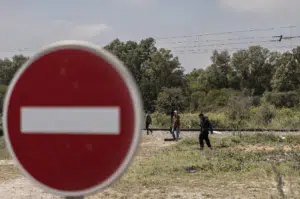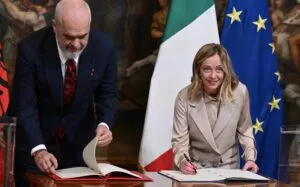Brussels – It hasn’t even gone into effect yet, but the Migration and Asylum Pact is already insufficient for
more than half of EU member states. And their number will likely increase during the next European legislature, given the twenty-seven countries’ rising tendency to advocate for a more restrictive migration policy for those arriving on EU soil. “The current challenges related to the EU asylum and migration system, including the sharp increase in irregular arrivals, are unsustainable,” is what 15 EU governments—Italy, Austria, Bulgaria, Cyprus, Denmark, Estonia, Finland, Greece, Latvia, Lithuania, Malta, the Netherlands, Poland, Czech Republic, Romania— write in a joint letter by the relevant ministers addressed to the European Commission’s services and its head of home affairs, Ylva Johansson, calling for the development of “new solutions to deal with irregular migration in Europe.”

With less than a month to go before the European elections that will give an initial indication of the trends of the voters on this issue, the starting point of the letter sent yesterday (May 15) by the 15 ministers is the support for “stability and social cohesion, and avoid risking of polarization of European societies and the loss of unity in the family of EU Member States.” There is no reference to the rights of incoming migrants (other than a generic reference to the fact that “the continuing challenge of coping with the consequences of irregular migration to Europe impedes our ability to provide better protection and livelihoods to more refugees”) in line with the change of narrative that also permeated the von der Leyen Commission in less than one legislative term. The key message of this shift toward an increasingly restrictive migration policy is easily identified in the call to “change our focus from managing irregular migration in Europe to supporting refugees as well as host communities in regions of origin.”
The first mention of the new Migration and Asylum Pact—on which work will now have to begin both in Brussels and in the 27 capitals (except Denmark, which has an opt-out clause on home affairs, i.e., a non-participation option) for its implementation—concerns the “more robust” legal framework also to “enhance the security of our external borders and create more efficient asylum procedures.” But the focus is all on the “complementary efforts” that, in a rhetorical device already used by the Meloni government, also require the EU Commission to “think outside the box” to “identify, elaborate and propose new ways and solutions to prevent irregular migration in Europe” with a clear indication to the next EU executive: “If necessary, the Commission is invited to propose the necessary targeted legislative changes to implement the proposed measures in EU law.”

From left: the Prime Minister of Albania, Edi Rama, and the Prime Minister of Italy, Giorgia Meloni, in Rome on Nov. 6, 2023 (credits: Tiziana Fabi / Afp)
The proposals of all the Baltic countries, the MED5 (minus Spain), almost all of Eastern Europe (except Hungary and Slovakia, which have even tougher positions), the Nordics and the Netherlands (whose new government agreement calls for an opt-out for the common migration and asylum policy), highlight first of all the need for “comprehensive, mutually beneficial and durable partnerships with key partner countries along the migratory routes.” The inspirations are the EU-Turkey statement of 2016 and the EU-Tunisia Memorandum of Understanding of July 2023, but the exploration of “possible place of safety arrangements and transit mechanisms inspired by the existing Emergency Transit Mechanisms” to bring migrants rescued at sea “to a partner country outside the EU” is also proposed. In this case, the “durable solutions” to be sought could also be built on “models such as the Italy-Albania Protocol” signed by the respective premiers, Giorgia Meloni and Edi Rama, on November 6, 2023, and already a paradigm in half the Union.
Among other proposed measures is the strengthening of “internal and external aspects” of the return “of those not in need of international protection,” including examining “potential cooperation with third countries on return hub mechanisms where returnees could be transferred to while awaiting their final removal.” On this specific aspect, the 15 ministers’ call to the Commission and their other colleagues is not only to “explore potential models within the current EU acquis” but, above all, to consider “the potential need for changes to the Return Directive,” one of the Pact’s two remaining unfinished legislative files. Added to this is a tightening of visa policy “since many asylum applications in the EU are made by people from visa-exempt countries or by people with a Schengen visa,” and also a greater strengthening of the new legal framework on the instrumentalization of migration with “adequate and effective tools and measures so that member states can act swiftly” as in the case of the “recently orchestrated hybrid attacks from the Belarusian and Russian regimes.”
Of particular note in the permeating view of outsourcing migration management is finally the push to “transfer asylum seekers for whom a safe third country alternative is available to such countries.” as is already being considered by the European People’s Party (EPP) of the current chairwoman of the European Commission and Spitzenkandidatin at the June European elections, Ursula von der Leyen, disturbingly similar in its similarities to the UK’s disputed “Rwanda model”. The Commission is invited to submit a proposal to designate a list of “safe” third countries at EU level, “as envisaged in the new Asylum Procedures Regulation” of the Migration and Asylum Pact: in this context, both the application of the “safe” third country concept in EU asylum law should be re-assesed in order to take “concrete and immediate” measures and the connecting criteria “during the planned review in 2025.” Today (May 16), during the daily meeting with the press in Brussels, the EU Commission’s spokeswoman responsible for Home Affairs and Migration, Anitta Hipper, confirmed that the Berlaymont services have received the letter signed by the 15 EU member states: “We need time to study it, it is a complex text with many elements.” But in the meantime, the EU executive’s main focus is on “the implementation of the Migration and Asylum Pact,” with the presentation of the joint implementation plan scheduled for June 12, as reflected in the latest version of the agenda of the College of Commissioners.
English version by the Translation Service of Withub








